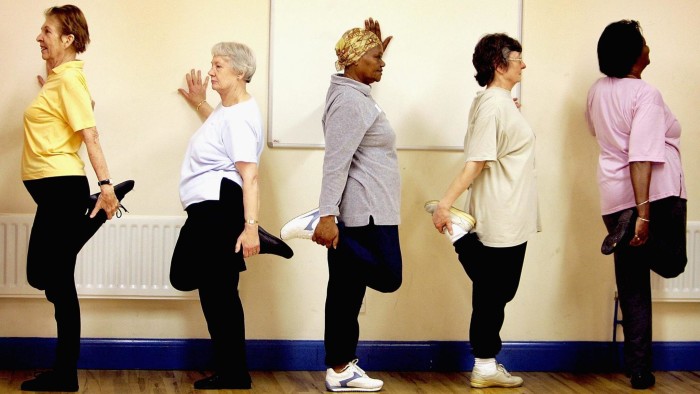UK pensions: tough choices as ‘old age support ratio’ shrinks

Roula Khalaf, Editor of the FT, selects her favourite stories in this weekly newsletter.
Over the course of the 20th century the UK made big strides to improve the life expectancy of its citizens, who 100 years ago were considered middle-aged at 25.
Back in 1901, a male could typically expect to live to 45. By 2012, life expectancy for men had nearly doubled to 79, according to the Office for National Statistics (ONS).
While rising longevity is cause for celebration, the challenges of a greying population are looming large, not only for retirement income systems, but also for health and social care services.
As in other developed countries, advances in medicine and diets have contributed to UK citizens living longer, a trend set to continue. By 2050, the proportion of the UK population aged 65 and over is projected to reach nearly a quarter at 24 per cent, up from 17 per cent in 2012, according to the ONS.
Strikingly, the fastest increases will be among the “oldest old”, with the proportion aged 85 and over forecast to treble from 2 per cent to 6 per cent.
Academics say these rapidly evolving demographic changes will affect everyone in society, regardless of age.
“At worst, not only could it imply rising poverty, poor health and the erosion of social care for those in old age over the coming decades, but also lower standards of living for all of us, as ageing acts as a drag on economic growth and the future delivery of public services,” says David Sinclair, director of the International Longevity Centre UK, a think-tank.
One of the main worries is that as the proportion reaching retirement age grows, the number of working age people will shrink as birth rates decline.
This is a concern because UK state pension payments are funded through taxation and national insurance contributions from those of working age.
The number of working age people to every pensioner, or the “old age support ratio”, is forecast to fall to 2.9 by 2050, from 3.3 in the mid-1970s to 2006.
“Tax revenue from those in work may fail to keep up with demand for social security and healthcare from an increasingly large proportion of people aged over 65 and out of work and who have poor health,” adds Mr Sinclair.
“This will force governments to make tough choices.”
Given this looming problem, the government has pushed back the qualification age for the state pension to 67 by 2028. Currently, the state pension age is set to equalise at 65 for women and men by 2018.
It has also taken steps to address big shortfalls in private pension savings, through the automatic enrolment of eligible staff into workplace pensions.
Under this policy, introduced three years ago, 2 per cent of a worker’s qualifying earnings is saved into a pension, comprising a contribution from employer, employee and tax relief, rising to 8 per cent by 2018.
Since the policy was introduced, 5m have been automatically enrolled. But there is a concern new “Freedom and Choice” reforms giving pension savers full flexibility to spend pension savings as they wish, such as on cars or holidays and not on a secure pension income, could undermine auto-enrolment.
“Before the age of 65, workers are actively nudged into pension saving through auto-enrolment,” says James Lloyd, director of the Strategic Society Centre, a think-tank.
“At retirement, the government provides no steer whatsoever. In future, many more will be defaulted into pension saving, but left fundamentally unprepared for the complex choices around how to use their pension pots.”
The government insists that big reforms to the state pension, which will reduce reliance on means-testing, will provide a firmer foundation for future retirees and a safety net if they exhaust their private pension savings.
But others warn of gaps in the new policy framework that need to be “urgently” filled.
“Chief among these is the need to come up with ‘default pathways’ to provide a low-risk option for people who do not feel confident with managing their money actively over the whole of what could be a very long retirement,” says Jane Vass, head of public policy with Age UK, the campaigning group.
“Unless this is tackled we do run the risk that people will enter later old age with seriously depleted savings. This will become more urgent, as more people retire without the safety net of a defined benefit pension.”
The challenges of ageing societies are not unique to the UK, with other countries facing similar tough decisions over the viability of their retirement income systems.
But with one in three babies born today in the UK expected to live to 100 some believe citizens need to realise the sharp realities of an ageing society.
“We must make it explicit to UK citizens that the responsibility for the three pillars of the welfare state; securing a basic retirement income, help during periods of unemployment, and support for health and social care will lie both with the individual as well as with the state,” says Mr Sinclair of the ILCUK.
“The state should always be there to provide a base level of support for those in need, but it may not be practical to promise anything more.”
Comments